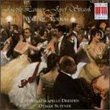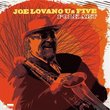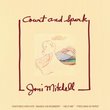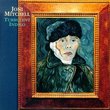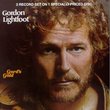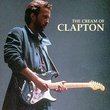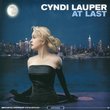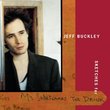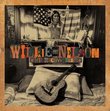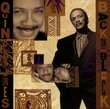| All Artists: Joni Mitchell Title: Song To A Seagull Members Wishing: 8 Total Copies: 0 Label: Warner Bros / Wea Release Date: 10/25/1990 Genres: Folk, Pop, Rock Styles: Singer-Songwriters, Oldies, Vocal Pop, Folk Rock Number of Discs: 1 SwapaCD Credits: 1 UPCs: 075992744126, 075992744140, 759927441266 |
Search - Joni Mitchell :: Song To A Seagull
 | Joni Mitchell Song To A Seagull Genres: Folk, Pop, Rock
No Description Available. Genre: Popular Music Media Format: Compact Disk Rating: Release Date: 10-MAR-1992 |
Larger Image |
CD DetailsSynopsis
Product Description No Description Available. Genre: Popular Music Media Format: Compact Disk Rating: Release Date: 10-MAR-1992 Similar CDs
Similarly Requested CDs
|
CD ReviewsThe most underrated Joni CD scottanth | Blair, NE United States | 09/16/2001 (5 out of 5 stars) "This album has so often been deprecated by fans and critics of the great Mrs. Mitchell. Too verbose and sophomoric! Too gloomy! Poorly-recorded! Stuck in its era! Or, the damning-with-faint-praise, It held forth the promise of what was to come! Well, admitting a partiality to her early work (pre-"Don's Juan Reckless Daughter"), I would rate this as the third-best Joni album (out of 17 in her career) behind only Blue and Ladies of the Canyon. Yes, it's even better than the great Court and Spark, or even its most-comparable competitor, Clouds. Musically, Song to a Seagull is grand in its simplicity - the vast majority of the songs feature Joni's fascinating guitar work as the stark support for her piercing, soaring soprano. While Joni's vocals are schooled and formal, they are nonetheless heartbreakingly beautiful, and the looseness afforded by the spare instrumentation (not to mention "producer" David Crosby's love of cavernous echo) gives this a stormy romanticism reminiscent of Tim Buckley's Happy Sad. As for the song selection, it would seem that in response either to what was popular at the time, or to Joni's personal outlook and mood as the album was assembled, she eschewed the many of her songs already made popular by other artists - "Both Sides Now," "Urge for Going," "Circle Game," "Chelsea Morning," "Eastern Rain," etc. - in favor of several that consistently featured fairy-tale or nautical imagery. The lyrics, in all of their fanciful, Byzantine Tolkienisms, can be taken or left - I, for one, embrace them! And so will anyone else who appreciates colorful escapism. What carries the day here, though, is the wistful, melancholy, fiercely free and lonely mood created in the themes of these stories of being stung in life and love - and of stinging others ("Cactus Tree") - by Joni's singing of her haunting melodies. "I Had a King," with its arppegiated "tenement castle" dismissal of the former Mr. Mitchell and the oppression of traditional marriage, has long been my favorite, but there's so much else to appreciate here - "Sisotowbell Lane," "The Dawntreader" (which makes interesting use of the smoky low end of Joni's range - the only range she can use anymore!), the much-ballyhooed anthem "Cactus Tree," and especially the woefully underrated title song. Freedom, dreaminess, and lonely sorrow. I believe that Song to a Seagull (the album, but especially the song) is a personal crie de coeur for the loss of innocence - and a despairing of the possibility of ever finding a soulmate or making a relationship work. And yet there is a retained innocence in the stark openness of Joni's writing and performance. It captures a Joni Mitchell that was not before, and would never be again. This album is so often condemned for being stuck in its time, but those aspects which date it the most are its very appeal, to these ears at least. It takes a certain charming naivete to engage in the hippy-dippy imaginings of some of these lyrics and the Loreena McKennitt-esque antiquarian vocal formality. If you like Nick Drake, Renaissance, Denny-era Fairport, or Astral Weeks, you should love this classic." Joni Mitchell's Debut Album Is Like Paintings Done Via Music M. Hart | USA | 04/04/2003 (5 out of 5 stars) "Recorded in the midst of the Vietnam War and surrounded by sweeping social changes, Joni Mitchell's 1968 debut album "Song to a Seagull" is an elegant and timeless microcosm. The songs are captivating and complex, but use simple instrumentation. Her primary accompaniment is usually her own acoustic guitar, but she is occasionally joined by bass, piano or harmonica. She is also frequently heard providing her own backup singing by recording twice. The album draws the listener into a misty and often melancholic realm through her unique tenor voice, whose range is fully demonstrated. Her lyrics are as descriptive as looking at a painting. My descriptions and ratings (out of 5 stars) of each song follow.1. "I Had a King" (5). A melancholic song about lost love sung expressively with an equally expressive acoustic guitar. 2. "Michael from Mountains" (5). Several key changes occur in this more upbeat song about romance 3. "Night in the City" (5+). Fast and exhilarating song about going out on the town, with Joni herself providing her own backup harmony and accompanied by piano and bass. 4. "Marcie" (5+). A soft, melancholic but very emotional song about a woman waiting to her from her man, sung in a minor key with several key changes. 5. "Nathan La Franeer" (4.5). An emotional and complex song about riding a taxi driven by Nathan La Franeer through busy city streets. Sung mostly softly, but with several instense moments. Accompanied occasionally by a harmonica that imitates the sounds of traffic. 6. "Sisotowbell Lane" (4.5). A soft, slow and airy song about being home and gazing out from the front porch, sung primarily in high octaves. 7. "The Dawntreader" (5). A more intense and emotional song that Joni sings in her beautiful tenor range about sights and sounds of a harbor and going out to sea. 8. "The Pirate of Penance" (5+). Probably the album's most complex song with a Spanish flavor and fast singing reminiscent of a flamenco dancer and unusual chords and lyrics about a mysterious murder told by two people: Penance and the Dancer. 9. "Song to a Seagull" (5). A softer Spanish flavor blends with Joni's wide ranging voice in this melancholic song about reflections on decisions while watching the seabirds. 10. "Cactus Tree" (5+). A more upbeat and faster song, but still melancholic with lyrics about love, fear of commitment and war.I rate this elegant debut album by Joni Mitchell with a resounding 5 out of 5 stars. It's music and words are just as powerful as they were when it was recorded 35 years ago. I highly recommend it." Not your average debut MurrayTheCat | upstate New York | 12/17/2002 (5 out of 5 stars) "Joni Mitchell came out of the early-to-mid-60s folk scene, but her music defies categories such as folk, rock, folk-rock, etc. (Great music is certainly more than a categorical phenomenon.) "Song To A Seagull" (1968) was her debut, but in this case, debut by no means spells beginner. (Interestingly, many of the songs on "Clouds" (1969) were written prior to this album.) Even here, she very convincingly offers something that fills the cracks between genres: a unique artistry that blends, to varying degrees, the heartfelt simplicity of folk, the rhythmic, youthful allure of rock and the expansive, detail-mindedness of classical. (Later she would incorporate the improvisational, bonds-loosened feel of jazz as well.) She accompanies herself with double-tracked acoustic guitar--enchantingly played. Occasionally, other instruments are unobtrusively added. The sound of the recording is atmospheric, ideal for the program. For the most part the music broods, but there are a few bright spots. Joni's a great storyteller and the characters are portrayed with a strong sense of reality: songs about common relationships, people we may have met, emotions we may feel at times or thoughts we may have once pondered.As the album begins, her arpeggiated guitar chords mesmerize. The melody doesn't travel the well-worn path. We know straightaway that this is no average songwriter. The music is rich and complex, but she presents complexities so simply. One forgets how advanced the music is as she draws the listener into a world of magic and aural wonder. "I Had A King" and "Michael From Mountains" are moody and beautiful. "Night In The City" adds piano and bass and has a strong, rhythmic 6/8 feel. On the chorus, the double-tracked harmony is divine. The poignant "Marcie" is a favorite and "Nathan La Franeer" is quite moving.Joni draws attention to certain lines in very interesting ways. For example, in "Sisotowbell Lane" she takes the melody from the second to the last line of the verse and repeats it on the second to the last line of the chorus. The lyrics are similar as well. But, she holds the note on the verse and cuts off the one on the chorus. This cut-off note sets us up for the last line of the chorus. At that point, the projected imagery expands from colorful to so vibrantly tactile you can almost touch it. Here's an illustration:Last part of the first verse:"Jovial neighbors come down when they will--With stories to tell--Sometimes they do [This melody will be repeated below, "do" is sustained here.]--Yes sometimes we do"Last part of the first chorus:"Eating muffin buns and berries--By the steamy kitchen window--Sometimes we do [The melody from above is repeated here, "do" is short, creating great anticipation.]--Our tongues turn blue" [Because of the anticipation and the rhythmic emphasis on the words "tongues turn," these blue tongues become as vivid as you can possibly imagine.]"Tongues turn" is a measure of 2 rather than 4--the V7 chord has been held for a bit longer than usual up to this point, so that when it finally resolves to the I chord on the note for "blue," the emotional release is added to the imagery. I think she's a genius."The Dawntreader," "The Pirate Of Pennace" and "Song To A Seagull" are each brilliant and enchanting. She ends with the charming "Cactus Tree," yet another thought-provoking masterpiece.For her debut, Joni Mitchell produces something original (and in the world of popular music, that is rare indeed). The album reveals a master at work; not the work of an amateur having just learned to finger three or four chords, or having just learned to make melody using the most basic of scale tones. And, these are not the lyrics of a beginner, a flower child or a sophomoric "student" of the art. Here we have the uncommon work of a true artist. This isn't music that "rocks." It's cerebral, beautiful, thought provoking and mature--free of any pretenses. After listening to her work, most other popular music will seem so incredibly shallow.Many seem to prefer Joni on her more rhythmically involved albums. I like those too, but I prefer the ones--like this one--that show off her quietly brooding magic, her marriage of the earthy and the celestial. In my mind, if you don't know Joni Mitchell and don't need strong beats to be entertained, this is the place to start. This, or the glorious "Clouds" (1969), will do just fine to introduce you to her world of sophisticated enchantment.
Cheers, Murray" |

 Track Listings (10) - Disc #1
Track Listings (10) - Disc #1